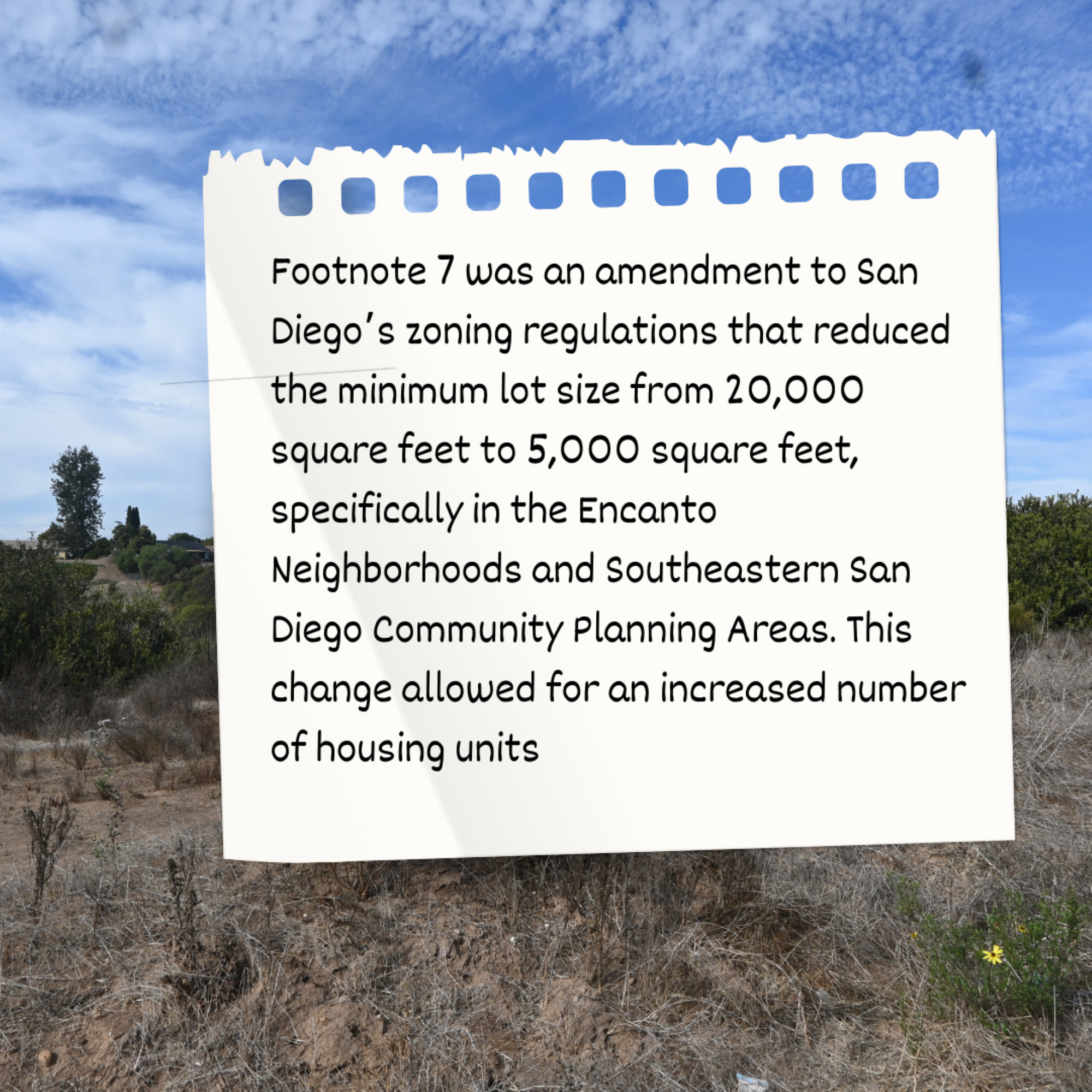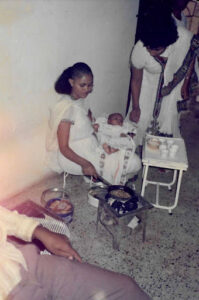
By Macy Meinhardt, V&V Staff Writer and CA Local News Fellow
Martha Abraham stood fearlessly at the podium of City Council chambers as she stared down the eyes of authority.
“You can have blood on your hands, or you can do the right thing,” said Abraham, a resident of District 4.
Abraham was in City Hall last January to oppose Footnote 7. The regulatory zone change would have brought hundreds of new housing developments into Emerald Hills and Encanto—areas that already lack support and resources from the city.
For Abraham, who grew up in Emerald Hills and is now a homeowner there, the intent of Footnote 7 was obvious. It was structural racism at play.

“What infuriated me the most was the injustice,” said Abraham in an interview with Voice & Viewpoint. The city faces a severe housing shortage, and the footnote worked to allow more homeownership opportunities in an affordable area.
But the exclusive and non-transparent nature of Footnote 7 blurred that intent to something more sinister. The footnote had only applied to Southeastern neighborhoods, areas known for their high Black and Latino population and history of racist housing practices.
“A housing crisis is being weaponized to destroy our community and violate our community plan,” said Martha during the Jan. 28 meeting.
Years of back and forth with the city over the housing projects culminated in this moment. After purchasing a home in Emerald Hills in 2019, Martha began to join meetings held by the Emerald Hills Neighborhood Council. Since then, she has evolved into a key advocate for her community, specifically in how it is fairly treated and developed.
Around 2021, Martha began noticing city-posted signs throughout her neighborhood announcing new housing projects. The city’s plans for the Radio Tower Lot in Emerald Hills particularly caught her eye. The developer, D.R. Horton, wanted to put 120 homes on a lot space that was only zoned for 70.
Unable to get a clear answer from the city on how this could be allowed, she joined forces with other neighbors in the Chollas Valley Community Planning Group to take matters into their own hands.
After long nights of sifting through city records and decoding legal jargon, they found their smoking gun. Hidden amongst the city’s Land Development Code Update, passed in 2021, was Footnote 7, a zone change that allowed projects like the Radio Tower Lot to take place.
T-shirts and posters were made, and meetings were held to get community members involved in the effort to remove the footnote. Tenacious advocacy and persistence displayed by community members like Martha led to the repeal of the footnote by City Council on March 4.
It wasn’t Abraham’s first time speaking at City Council, and it most likely won’t be her last.

“When I’m talking to an elected official, I press them to the max,” said Martha. “I voted for you and I’m gonna hold you accountable.”
As a lifelong resident of Southeastern San Diego, she embodies the bold spirit woven within the community’s rich history. This Women’s History Month, Voice & Viewpoint proudly shines a spotlight on voices like Abraham’s that drive local change.
Roots in Resilience
Martha’s story begins with a lineage of strength and perseverance.
She was born in Sudan in 1986 to Eritrean refugees fleeing the civil war between Ethiopia and Eritrea. At eight months old, her family immigrated to the United States. Despite not knowing the language or culture, her parents came in pursuit of a better life.

Landing in San Diego, Martha’s parents were adamant about the importance of their children receiving a quality education. To them, it was the fastest way out of poverty; a ticket to succeed in America.
Martha recalled that the schools in the Southeastern were failing. As a result, Martha’s family enrolled her and her siblings in a program to be bused into what was considered better-performing schools north of the community.
In 1999, the family moved to the Emerald Hills neighborhood, an upgrade from where they had lived prior. For her and her family, it was the American dream.
“I was so amazed that Black people lived this way. It was a prominent Black neighborhood. Everybody had careers–It was judges, lawyers, all these established Black community members. We were so impressed.”
Her family eventually moved to Rancho San Diego, where she attended Valhalla High School. By her senior year, she dreamed of a healthcare career, with sights set on attending Howard University, the nation’s top historically Black college.
Then a moment came that stopped Martha right in her tracks. She had found out she was pregnant.
Fighting Against The Odds
She was a devout Christian at the time. Bound by her faith, Martha believed there was no other option but to go through the pregnancy.
“It was the hardest thing I ever had to do in my life,” she said, on her decision to become a mother.
But it would be a choice that would change her life for the better, she said.
|
Over the next several years, Martha worked to defy those odds, not just for herself, but for her son. “I had to make sure my son didn’t become a victim of that cycle,” she said
Martha harkened back to the core value instilled in her when she first immigrated to America. No matter what, she would not stop her pursuit of an education.
Nothing was easy, “I struggled,” she said.
As a young mom in survival mode, “I worked so that I could pay for daycare, so that I could go to school,” she said. She used public transportation to get around and lived in a transitional living program.
Martha attended community college then transferred to San Diego State University to earn a bachelor’s in nursing. She would eventually receive her Masters in Science and Nursing from Grand Canyon University.
Over the next decade, she built her career as a nurse in the Neonatal Intensive Care Unit (NICU), caring for infants.
By 2019, Martha had accomplished many milestones. She was educated, had an established career, a healthy son, and was now a homeowner in the same neighborhood she lived in as a child, Emerald Hills.
‘Raising a Black Boy during Black Lives Matter Movement’
Martha became an advocate from the moment she became a mother, she said. But June 2020 would challenge her to confront the hard truths of raising a Black teenage son during the Black Lives Matter Movement.
Like many people, Martha couldn’t escape the circulation of images and videos showcasing the horrific murder of George Floyd. As the mother, the trauma cut even deeper. Fear was an unwelcome companion.
“As a parent who lives in Southeast San Diego with a son at Lincoln High School, I’m now operating out of fear for everything he did,” she said, recalling the mindset she and many Black Americans felt during the time.
“I was waking up in the middle of the night having dreams that my son is getting shot by the police in front of my house–that is the trauma that we had to live with.”
Determined to protect him, she built relationships with her district’s police captain,

advocating for more community policing and an end to racial profiling of teenagers in Southeastern.
“The perspective that’s there, we have to break it,” said Martha, referring to the divide between communities and law enforcement. From this experience, Martha has made it a goal to work to rebuild trust between police and racial groups in her community.
Martha said that as a mother, she often acted out of fear and survival. However, despite the odds stacked against her, she said she could not be more proud of who her son turned out to be.
“He turned out to be such a great kid,” Martha said as she beamed.
Stepping into Entrepreneurship
With the most hands-on years of motherhood coming to an end, by 2023, Martha started to imagine the next chapter in her life. She noted how she felt a calling to use her skills in nursing to help the senior community. But how or what that would look like was unknown.
By chance, she met a woman a few months later who was a nurse and had owned a home care agency.
“You can have a business as a nurse? What do you do?” Martha remembered asking. From there, Martha absorbed as much information as she could, engaging with mentors to get advice on opening an agency of her own.
All the pieces began to fall together, “this was the calling I have felt,” she said.
By Sept. 2024, Martha’s own home caregiving business for senior adults was open. Her intent behind the company is to combat the traditional perspective of what home care is.
“Our aging population is growing, and the system we have in place currently is not going to be able to maintain what’s coming,” she said.
In response, Martha’s home care agency focuses on helping older adults age at home while also improving their quality of life and independence. With a specialized care model and clinical expertise, she aims to keep seniors healthier longer and reduce their need for extensive care.
Like numerous things in her life, being an entrepreneur “has not been easy,” Martha said, “but we’re on a mission,” she maintains.
What’s Next For Martha?
At this stage of her life in 2025, Martha feels like she has finally found the woman she is meant to be.
Looking ahead, Martha envisions establishing a foundation to provide scholarships for local youth in Southeastern San Diego.
“It is very evident that education is the quickest way out of poverty. My siblings and I are a product of that,” she said.
She recalled a powerful sentiment someone once shared with her: “You’re not only meant to do something great, but to become the greatest version of yourself.”
For Martha, her purpose is clear—she was born to serve, and she intends to keep doing just that.


